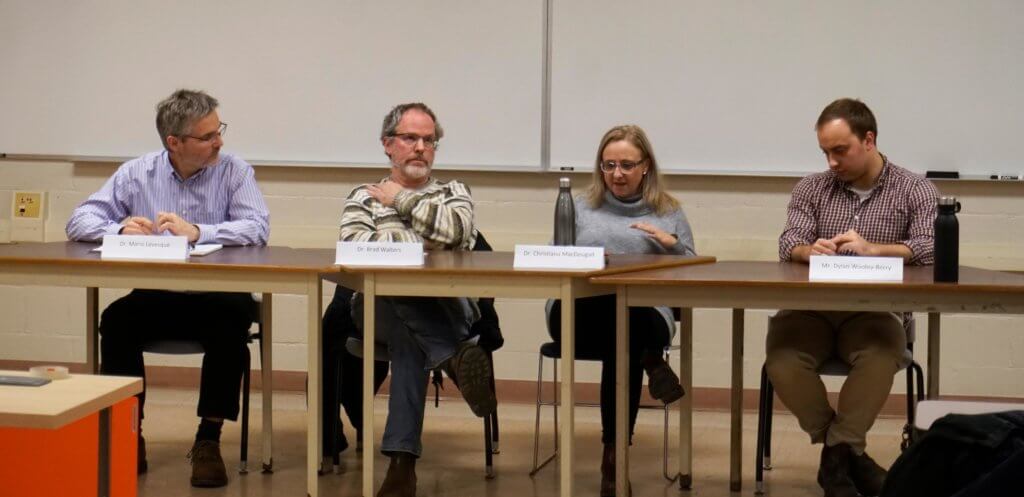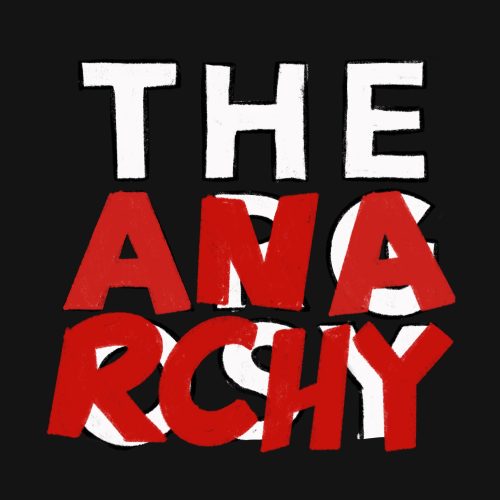Political Science and International Relations society hosts Federal election discussion panel

Last Thursday, the Political Science and International Relations Society held a discussion panel on the recent federal election. Four guest speakers discussed questions from the hosts of the event about the federal election that happened in October.
The panelists at this event were Dylan Wooley-Berry, a Mount Allison alumnus and former MASU president; Dr. Mario Levesque, a political science professor; Dr. Brad Walters, an environmental studies professor; and Dr. Christiana MacDougall, a sociology professor. It was moderated by fourth-year student Jonathan Ferguson.
The first question asked was what the panelists found to be the biggest surprise of the election. Wooley-Berry said he was surprised by the lack of moderation of the Conservative party.
“I was sure the Conservative party was going to moderate its platform moving in. I really thought that because of the delayed platform launch.” He also was shocked by the Conservative party’s lack of an environmental platform. “I remember listening to their environmental policy and being giddy because it was non-existent. How do you expect to govern when 60 per cent of the country wants an environmental policy and you don’t have one?”
Walters was shocked by how the Green party performed in this election. “I anticipated this was going to be a pretty significant breakthrough for the Greens given the sorry state of the NDP going into the election.” He blames this loss on vote splitting: “This was a huge disappointment for the Green party but it also proves something that they have long denied, which is that fundamentally we have a serious vote-splitting problem on the centre left.”
Leveque was not particularly surprised by anything but said he was disappointed by some of the Liberal party’s continued arrogance. “They really don’t understand Canadians,” he said. “They have no idea what a common Canadian wants and desires or anything like that. Their inability to want to learn is the thing that is frustrating. That isn’t leadership.”
Next, the panelists were asked about their opinions on proportional representation. MacDougall said that she liked the idea of a proportional government.
“It would be interesting to see what would actually be different about proportional representation. [To see] if you have greater voter turnout, less strategic voting, a little more focus on issues rather than region,” she said. “There is still a lot of room for improvement in terms of greater gender representation.” She also said that “Proportional representation is a way that we can get greater diversity in our government.”
Wooley-Berry countered MacDougall’s opinion by saying that although, in his opinion, neither proportional representation or first past the post are ideal, he would choose to keep the status quo. “If I had to choose between first past the post and proportional, I’d probably choose neither, but I think out of the two of them first past the post is better for a number of reasons,” said Wooley-Berry. His main point was that “The first past the post has the ability to curtail the most extreme voices and make sure they don’t have a platform. For example, the People’s Party would have upwards of 15 or 17 seats if the results held; today they have zero. I think Canadian democracy is healthier because of it.”
Walters said that proportional representation was not ideal, saying that “I can imagine that if we went to proportional representation system what we would see is new political parties form based largely on geographic interests.
In this election, no Liberal seats were won in the Prairie provinces, so there is a concern about the lack of representation for these provinces in government. The last question was about how the Liberal minority government should proceed strategically regarding western alienation, considering that Saskatchewan and Alberta elected almost entirely Conservative MPs. Leveque said that Trudeau should “talk to western interests: let them know that [the Liberals are] fully committed to this pipeline and that they’re doing everything they can, yet at the same time convince other Canadians that [the Liberals are] going to fight climate change.” He said that “the challenge is talking to the western premiers.”
“It feels like the West is the problematic family member that is always complaining about how terrible the family is but you need to keep involved because we’re family and they also have some money that we need,” said MacDougall.
Wooley-Berry said that the Liberal party is not as focused on the West as on other regions of Canada. “It is a really interesting set of circumstances. To better understand it you have to look at how interests align. The best [the Liberal party] can do [in the West] is like six seats. If [they] want to win a majority [they] can get up to 30 seats in Quebec, shake another 20 out of Ontario and 20 in B.C.”
To conclude the panel, Wooley-Berry encouraged the audience to get more involved in politics regardless of their party. “For the system to improve we need to have more people who want to improve the system,” he said.





